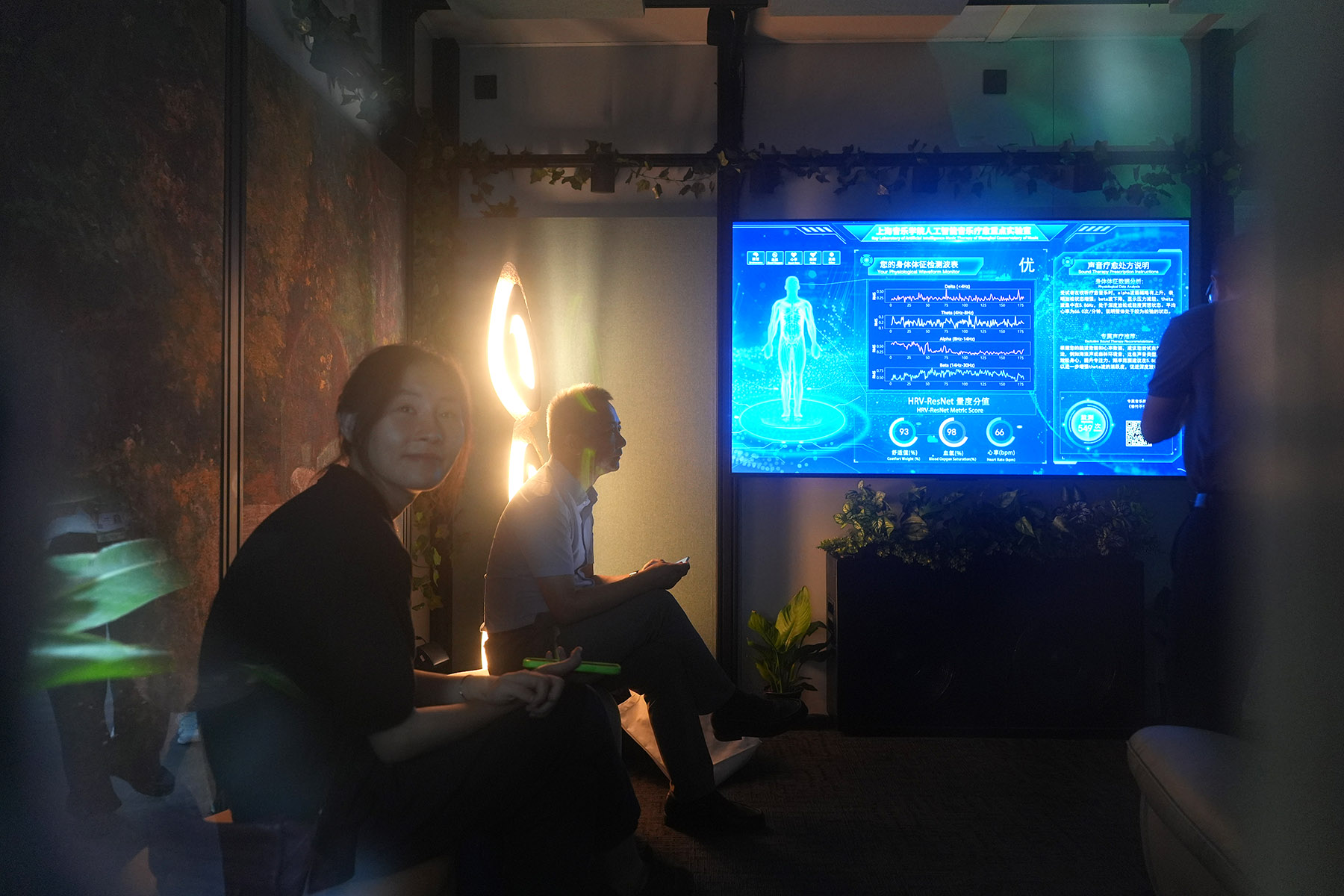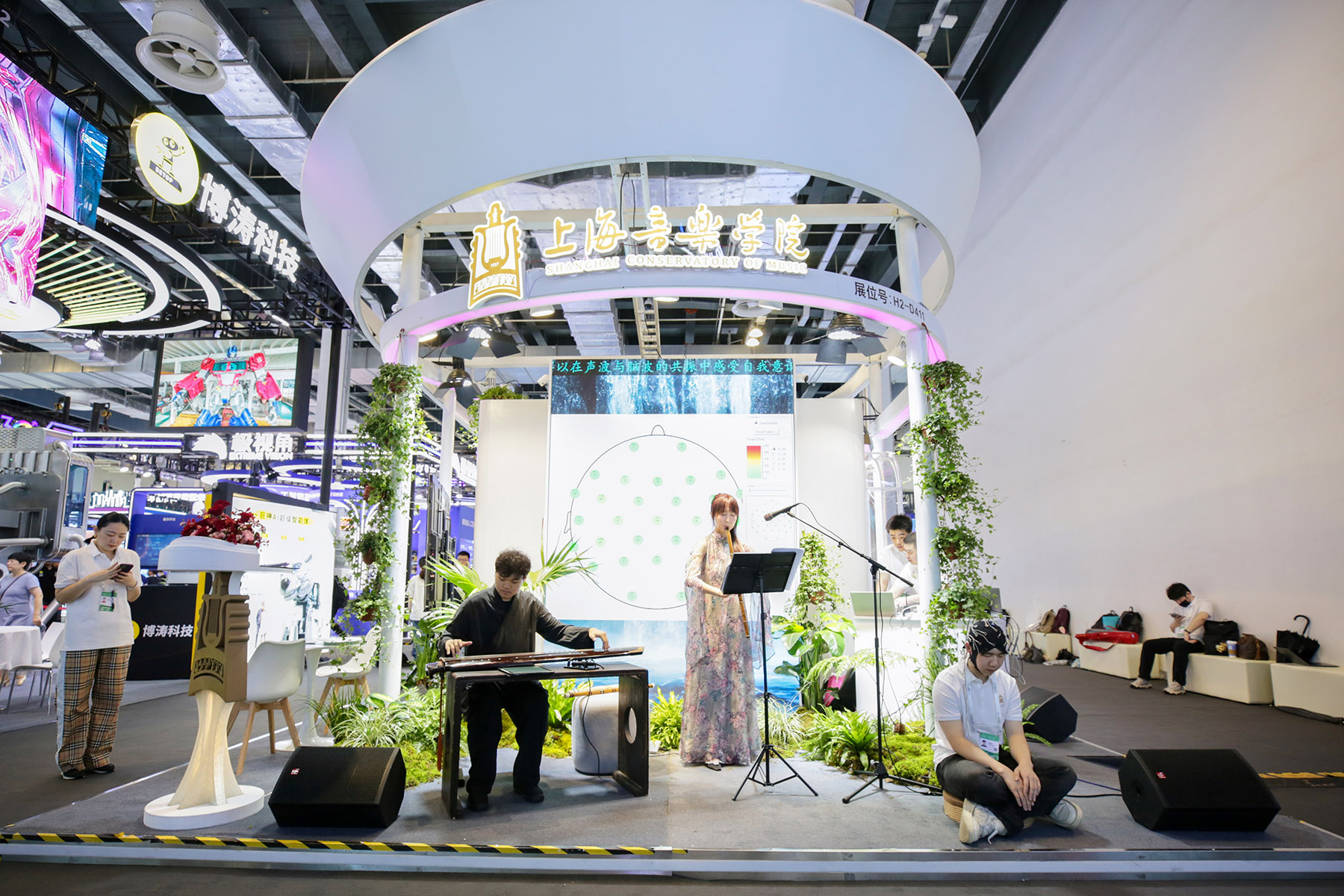Therapy pod exhibits innovation in combatting depression, sleep and overall health, He Qi reports.

Music has long been recognized for its healing powers, and when combined with artificial intelligence, this potential becomes even more precise and accessible. This sentiment, shared by Li Xiaonuo, vice-dean of the Research Institute of Music and Art at the Shanghai Conservatory of Music, resonated throughout the recent World Artificial Intelligence Conference in Shanghai.
Among the event's many technological marvels, the globally premiered AI music therapy pod from the Shanghai Conservatory of Music stood out, offering a serene, personalized healing experience.
Inside the pod, users are equipped with monitoring devices, such as EEG (electroencephalogram) headsets, HRV(heart rate variability) sensors, and conductive nail monitors. Reclining in zero-gravity chairs, they observe a large screen displaying real-time EEG data alongside vital signs, such as heart rate and blood oxygen levels. Meanwhile, ambient music featuring the natural sounds of chirping birds or flowing streams envelops them, providing a peaceful escape from the outside world.
READ MORE: China builds platform to hone AI edge
Ren Shihong, a postdoctoral researcher in artificial intelligence music generation at the conservatory, explains that the experience begins with a personalized questionnaire. Users provide details about their health status and birth date, which, combined with real-time physiological data, drive an AI music generation model to create a multisensory experience complete with synchronized visuals.
After the session, users receive a dataset of their therapy process and a personalized music prescription. "The system enhances attention, aids in healing and relaxation, and stabilizes heart rate," says Liu Hao, director of the AIMT Lab at the conservatory.

Li says: "The music therapy pod is a crystallization of the integration of technology and art." The college's music aesthetic psychology experimental center, established in 2017 and now part of the AIMT Lab, has published numerous Scientific Citation Index papers, laying the groundwork for the therapy pod.
Research into converting brainwaves to sound began in the late 20th century. Each person's resting brainwaves are unique and can be transformed into sound waves through algorithms, Li explains. AI's role in this field is crucial, as it enables the rapid retrieval of personal trait patterns and generates soundscapes based on real-time physiological indicators.
"People's responses to sound have commonalities and individual differences, involving high-level evaluative memory, conditioned reflex memory, and personal musical-cultural experiences — all part of high-level music cognition," Li points out, emphasizing the need for massive data computing, which AI provides. The goal is to leverage AI's power to reach even quantum-level computing.
According to experts, the therapy pod represents an interdisciplinary innovation featuring three key breakthroughs — a pioneering physiological data-based music-matching algorithm; dynamic personalized healing plans; and the integration of acoustic engineering, bio-sensing, and AI.
Liu notes that the pod has potential applications in treating sleep disorders, depression, degenerative diseases, and even CMT (creative music therapy) for preterm infants, autism, and elderly health management.

Liu further elaborates on the concept of using natural field frequencies, such as the calming 40 Hz or heart rate-slowing 428 Hz, to create sound healing maps. The team aims to harness these natural frequencies to enhance public well-being through AI and music.
The project is already collaborating with hospitals and applying it to integrate art, medicine, and technology across various scenarios. It will soon be implemented in institutions like mental health centers and Shanghai Huashan Hospital to assist in treating autistic children, alleviating pain, and providing psychological comfort for students with exam anxiety.
Liu Yue, deputy director psychotherapist of Child and Adolescent Department at Shanghai Mental Health Center, highlights the global rise in anxiety and depression diagnoses. In 2021, China had an estimated 53.1 million patients suffering from depression, a significant increase since 1990. Among Chinese schoolchildren aged 6 to 16, about 17.5 percent are suffering or have once suffered from a mental disorder.
ALSO READ: AI meets anime in daily life
Liu Yue explains that AI's role in psychological treatment extends beyond its use in music therapy. AI can analyze social media posts and conversations to detect emotional changes through speech tone, rhythm, and word choice to identify risks of depression and anxiety. This helps clinicians quickly screen high-risk individuals for early intervention.
In psychological interventions, AI can guide patients through exercises like emotion journaling and cognitive restructuring using techniques from therapies such as Cognitive Behavioral Therapy.
She also highlights the Shanghai Mental Health Center's proprietary virtual reality training system for autism spectrum disorder, which enhances cognitive, behavioral, and emotional management skills. This patented system includes over 80 training scenarios and has been used 4,000 times.
"We are currently developing VR and neurofeedback-based tools for cognitive and emotional training in children and adolescents," she adds.
Contact the writer at heqi@chinadaily.com.cn


